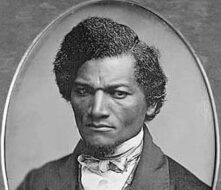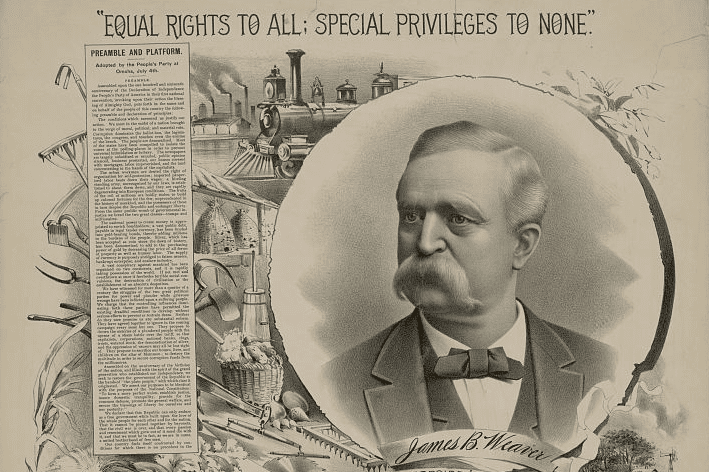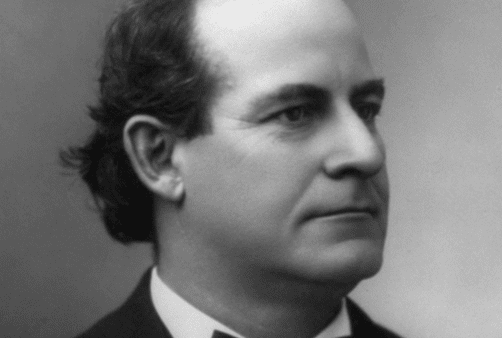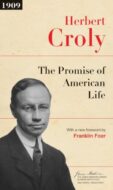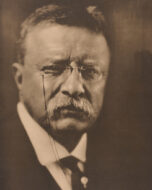
No study questions
No related resources
Introduction
A recession in 1893 led the Pullman Sleeping Car Company to reduce the wages of its workers. When it reduced wages, it did not reduce rents in the company housing it supplied its workers. As a result, the workers went on strike May 11, 1894. Eugene V. Debs had recently organized the American Railway Union (ARU). Although at first reluctant to get involved, he eventually seized on the Pullman strike as an opportunity to organize Pullman workers and add them to the ARU’s members. The Pullman Company refused to recognize the union. To make the strike effective, Debs organized a boycott of any train that had a Pullman car. Other labor leaders and labor organizations opposed the boycott, but ARU members around the country were able to disrupt interstate rail traffic, including that which carried the US mail. (See “King Debs,” Harper’s Weekly, July 14, 1894 for one example of the public perception this created of Debs and his union.)
To get the mail moving, President Grover Cleveland ordered US attorneys and the Army to deal with the strike, which had included acts of violence against trains and other railroad property. (The Governor of Illinois, seeing the strike as a state and local matter, claimed that Cleveland had no constitutional right to do so.) A federal court issued an injunction barring the union from hindering railroad traffic. Debs ignored the injunction. He was arrested on federal contempt and conspiracy charges. The conspiracy charge was dropped, as Debs mentions, but he was ordered to jail for contempt for ignoring the injunction. His attorneys appealed. The Supreme Court decided unanimously in In re Debs in favor of the US government and the power of the Federal courts to issue an injunction against the strike.
The Supreme Court’s decision was a setback for labor, as the courts proved willing in ensuing years to issue the injunctions that the Supreme Court had approved. As the Strike Commission report argues, however, outside the courts organized labor was finding its place in American life. In a conciliatory move, six days after the Pullman strike ended, Congress passed and Cleveland signed a law that established Labor Day, a national holiday honoring workingmen. In 1932, the Norris-LaGuardia Act gave unions full freedom of association and outlawed the kind of injunctions the Supreme Court had approved to end the Pullman strike. Public opinion toward unions changed in part because of the growing perception of the power of the so-called trusts. A “trust” was a way of establishing control over a number of firms operating in the same area of the economy. Shareholders in different corporations transferred their shares to one corporate entity that held them (hence, a “holding company”). A trust could be used to establish a monopoly over an area of the economy. For this reason, “trust busting” became part of the U.S. government’s effort to ensure free markets in the United States.
In re Debs, 158 U.S. 564 (1895). Available online from Justia. https://goo.gl/efDRTw
JUSTICE BREWER1, after stating the case, delivered the opinion of the court.
The case presented by the bill2 is this: the United States, finding that the interstate transportation of persons and property, as well as the carriage of the mails, is forcibly obstructed, and that a combination and conspiracy exists to subject the control of such transportation to the will of the conspirators, applied to one of their courts, sitting as a court of equity,3 for an injunction to restrain such obstruction and prevent carrying into effect such conspiracy. Two questions of importance are presented: First. Are the relations of the general government to interstate commerce and the transportation of the mails such as authorize a direct interference to prevent a forcible obstruction thereof. Second. If authority exists, as authority in governmental affairs implies both power and duty, has a court of equity jurisdiction to issue an injunction in aid of the performance of such duty.
First. What are the relations of the general government to interstate commerce and the transportation of the mails? They are those of direct supervision, control, and management. While, under the dual system which prevails with us, the powers of government are distributed between the State and the Nation, and while the latter is properly styled a government of enumerated powers, yet within the limits of such enumeration, it has all the attributes of sovereignty, and, in the exercise of those enumerated powers, acts directly upon the citizen, and not through the intermediate agency of the State. . . .
[In support of this claim, Justice Brewer here cited judicial precedents as far back as McCulloch v. Maryland, 1819. We have included in this excerpt only a few of his other numerous references to and discussions of judicial precedents and Congressional legislation.]
Among the powers expressly given to the national government are the control of interstate commerce and the creation and management of a post office system for the nation. Article I, section 8, of the Constitution provides that
the Congress shall have power . . . Third, to regulate commerce with foreign nations and among the several States, and with the Indian tribes. . . . Seventh, to establish post offices and post roads.
Congress has exercised the power granted in respect to interstate commerce in a variety of legislative acts. . . .
As, under the Constitution, power over interstate commerce and the transportation of the mails is vested in the national government, and Congress, by virtue of such grant, has assumed actual and direct control, it follows that the national government may prevent any unlawful and forcible interference therewith. But how shall this be accomplished? Doubtless it is within the competency of Congress to prescribe by legislation that any interference with these matters shall be offences against the United States, and prosecuted and punished by indictment in the proper courts. But is that the only remedy? Have the vast interests of the nation in interstate commerce and in the transportation of the mails no other protection than lies in the possible punishment of those who interfere with it? . . .
. . . The entire strength of the nation may be used to enforce in any part of the land the full and free exercise of all national powers and the security of all rights entrusted by the Constitution to its care. The strong arm of the national government may be put forth to brush away all obstructions to the freedom of interstate commerce or the transportation of the mails. If the emergency arises, the army of the Nation, and all its militia, are at the service of the Nation to compel obedience to its laws. . . .
. . . [T]he right to use force does not exclude the right of appeal to the courts for a judicial determination and for the exercise of all their powers of prevention. Indeed, it is more to the praise than to the blame of the government that, instead of determining for itself questions of right and wrong on the part of these petitioners and their associates and enforcing that determination by the club of the policeman and the bayonet of the soldier, it submitted all those questions to the peaceful determination of judicial tribunals, and involved their consideration and judgment as to the measure of its rights and powers and the correlative obligations of those against whom it made complaint. And it is equally to the credit of the latter that the judgment of those tribunals was by the great body of them respected, and the trouble which threatened so much disaster terminated.
Neither can it be doubted that the government has such an interest in the subject matter as enables it to appear as party plaintiff in this suit. It is said that equity only interferes for the protection of property, and that the government has no property interest. A sufficient reply is that the United States have a property in the mails, the protection of which was one of the purposes of this bill. . . .
. . . Every government, entrusted, by the very terms of its being, with powers and duties to be exercised and discharged for the general welfare, has a right to apply to its own courts for any proper assistance in the exercise of the one and the discharge of the other, and it is no sufficient answer to its appeal to one of those courts that it has no pecuniary interest in the matter. The obligations which it is under to promote the interest of all, and to prevent the wrongdoing of one resulting in injury to the general welfare, is often, of itself, sufficient to give it a standing in court. This proposition in some of its relations has heretofore received the sanction of this court. . . .
. . . [W]hile it is not the province of the government to interfere in any mere matter of private controversy between individuals, or to use its great powers to enforce the rights of one against another, yet, whenever the wrongs complained of are such as affect the public at large, and are in respect of matters which by the Constitution are entrusted to the care of the Nation and concerning which the Nation owes the duty to all the citizens of securing to them their common rights, then the mere fact that the government has no pecuniary interest in the controversy is not sufficient to exclude it from the courts or prevent it from taking measures therein to fully discharge those constitutional duties.
The national government, given by the Constitution power to regulate interstate commerce, has, by express statute, assumed jurisdiction over such commerce when carried upon railroads. It is charged, therefore, with the duty of keeping those highways of interstate commerce free from obstruction, for it has always been recognized as one of the powers and duties of a government to remove obstructions from the highways under its control. . . .
Up to a recent date, commerce, both interstate and international, was mainly by water, and it is not strange that both the legislation of Congress and the cases in the courts have been principally concerned therewith. The fact that, in recent years, interstate commerce has come mainly to be carried on by railroads and over artificial highways has in no manner narrowed the scope of the constitutional provision or abridged the power of Congress over such commerce. On the contrary, the same fullness of control exists in the one case as in the other, and the same power to remove obstruction from the one as from the other. Constitutional provisions do not change, but their operation extends to new matters as the modes of business and the habits of life of the people vary with each succeeding generation. . . .The Constitution has not changed. The power is the same. But it operates today upon modes of interstate commerce unknown to the fathers,4 and it will operate with equal force upon any new modes of such commerce which the future may develop. It is said that seldom have the courts assumed jurisdiction to restrain by injunction in suits brought by the government, either state or national, obstructions to highways, either artificial or natural. This is undoubtedly true, but the reason is that the necessity for such interference has only been occasional. Ordinarily, the local authorities have taken full control over the matter, and by indictment for misdemeanor, or in some kindred way, have secured the removal of the obstruction and the cessation of the nuisance. . . .
That the bill filed in this case alleged special facts calling for the exercise of all the powers of the court is not open to question. The picture drawn in it of the vast interests involved, not merely of the city of Chicago and the State of Illinois, but of all the States, and the general confusion into which the interstate commerce of the country was thrown; the forcible interference with that commerce; the attempted exercise by individuals of powers belonging only to government, and the threatened continuance of such invasions of public right, presented a condition of affairs which called for the fullest exercise of all the powers of the courts. If ever there was a special exigency, one which demanded that the court should do all that courts can do, it was disclosed by this bill, and we need not turn to the public history of the day, which only reaffirms with clearest emphasis all its allegations. . .
Again, it is objected that it is outside of the jurisdiction of a court of equity to enjoin the commission of crimes. This, as a general proposition, is unquestioned. A chancellor has no criminal jurisdiction. Something more than the threatened commission of an offence against the laws of the land is necessary to call into exercise the injunctive powers of the court. There must be some interferences, actual or threatened, with property or rights of a pecuniary nature, but when such interferences appear, the jurisdiction of a court of equity arises, and is not destroyed by the fact that they are accompanied by, or are themselves, violations of the criminal law. . . .
Nor is there in this any invasion of the constitutional right of trial by jury. . . .But the power of a court to make an order carries with it the equal power to punish for a disobedience of that order, and the inquiry as to the question of disobedience has been from time immemorial the special function of the court. And this is no technical rule. In order that a court may compel obedience to its orders, it must have the right to inquire whether there has been any disobedience thereof. To submit the question of disobedience to another tribunal, be it a jury or another court, would operate to deprive the proceeding of half its efficiency. . . .
In brief, a court, enforcing obedience to its orders by proceedings for contempt, is not executing the criminal laws of the land, but only securing to suitors the rights which it has adjudged them entitled to. . . .
. . . It surely cannot be seriously contended that the court has jurisdiction to enjoin the obstruction of a highway by one person, but that its jurisdiction ceases when the obstruction is by a hundred persons. It may be true, as suggested, that, in the excitement of passion, a mob will pay little heed to processes issued from the courts, and it may be, as said by counsel in argument, that it would savor somewhat of the puerile and ridiculous to have read a writ of injunction to Lee’s army during the late civil war. It is doubtless true that inter arma leges silent,5 and in the throes of rebellion or revolution, the processes of civil courts are of little avail, for the power of the courts rests on the general support of the people and their recognition of the fact that peaceful remedies are the true resort for the correction of wrongs. But does not counsel’s argument imply too much? Is it to be assumed that these defendants were conducting a rebellion or inaugurating a revolution, and that they and their associates were thus placing themselves beyond the reach of the civil process of the courts? We find in the opinion of the Circuit Court a quotation from the testimony given by one of the defendants before the United States Strike Commission, which is sufficient answer to this suggestion:
As soon as the employees found that we were arrested, and taken from the scene of action, they became demoralized, and that ended the strike. It was not the soldiers that ended the strike. It was not the old brotherhoods that ended the strike. It was simply the United States courts that ended the strike. . . . [N]ot by the army, and not by any other power, but simply and solely by the action of the United States courts in restraining us from discharging our duties as officers and representatives of our employees.
Whatever any single individual may have thought or planned, the great body of those who were engaged in these transactions contemplated neither rebellion nor revolution, and when, in the due order of legal proceedings, the question of right and wrong was submitted to the courts, and by them decided, they unhesitatingly yielded to their decisions. The outcome, by the very testimony of the defendants, attests the wisdom of the course pursued by the government, and that it was well not to oppose force simply by force, but to invoke the jurisdiction and judgment of those tribunals to whom, by the Constitution and in accordance with the settled conviction of all citizens, is committed the determination of questions of right and wrong between individuals, masses, and States.
It must be borne in mind that this bill was not simply to enjoin a mob and mob violence. It was not a bill to command a keeping of the peace; much less was its purport to restrain the defendants from abandoning whatever employment they were engaged in. The right of any laborer, or any number of laborers, to quit work was not challenged. The scope and purpose of the bill was only to restrain forcible obstructions of the highways along which interstate commerce travels and the mails are carried. And the facts set forth at length are only those facts which tended to show that the defendants were engaged in such obstructions.
A most earnest and eloquent appeal was made to us in eulogy of the heroic spirit of those who threw up their employment, and gave up their means of earning a livelihood, not in defense of their own rights, but in sympathy [with] and to assist others whom they believed to be wronged. We yield to none in our admiration of any act of heroism or self-sacrifice, but we may be permitted to add that it is a lesson which cannot be learnt too soon or too thoroughly that, under this government of and by the people, the means of redress of all wrongs are through the courts and at the ballot box, and that no wrong, real or fancied, carries with it legal warrant to invite as a means of redress the cooperation of a mob, with its accompanying acts of violence.
We have given to this case the most careful and anxious attention, for we realize that it touches closely questions of supreme importance to the people of this country. Summing up our conclusions, we hold that the government of the United States is one having jurisdiction over every foot of soil within its territory, and acting directly upon each citizen; that, while it is a government of enumerated powers, it has within the limits of those powers all the attributes of sovereignty; that to it is committed power over interstate commerce and the transmission of the mail; that the powers thus conferred upon the national government are not dormant, but have been assumed and put into practical exercise by the legislation of Congress; that, in the exercise of those powers, it is competent6 for the nation to remove all obstructions upon highways, natural or artificial, to the passage of interstate commerce or the carrying of the mail; that while it may be competent for the government (through the executive branch and in the use of the entire executive power of the nation) to forcibly remove all such obstructions, it is equally within its competency to appeal to the civil courts for an inquiry and determination as to the existence and character of any alleged obstructions, and, if such are found to exist, or threaten to occur, to invoke the powers of those courts to remove or restrain such obstructions; that the jurisdiction of courts to interfere in such matter by injunction is one recognized from ancient times and by indubitable authority; that such jurisdiction is not ousted by the fact that the obstructions are accompanied by or consist of acts in themselves violations of the criminal law; that the proceeding by injunction is of a civil character, and may be enforced by proceedings in contempt; that such proceedings are not in execution of the criminal laws of the land; that the penalty for a violation of injunction is no substitute for, and no defense to, a prosecution for any criminal offences committed in the course of such violation; that the complaint filed in this case clearly showed an existing obstruction of artificial highways for the passage of interstate commerce and the transmission of the mail – an obstruction not only temporarily existing, but threatening to continue; that, under such complaint, the Circuit Court had power to issue its process of injunction; that, it having been issued and served on these defendants, the Circuit Court had authority to inquire whether its orders had been disobeyed, and, when it found that they had been, then to proceed under section 725, Revised Statutes . . . [to] enter the order of punishment complained of; and, finally, that, the Circuit Court having full jurisdiction in the premises, its finding of the fact of disobedience is not open to review on habeas corpus in this or any other court. . . .
We enter into no examination of the act of July 2, 1890, c. 647, 26 Stat. 209,7 upon which the Circuit Court relied mainly to sustain its jurisdiction. It must not be understood from this that we dissent from the conclusions of that court in reference to the scope of the act, but simply that we prefer to rest our judgment on the broader ground which has been discussed in this opinion, believing it of importance that the principles underlying it should be fully stated and affirmed.
The petition for a writ of habeas corpus is
Denied.
- 1. Associate Justice David Josiah Brewer (1837–1910). Appointed in 1889, Justice Brewer served on the Court until his death.
- 2. a bill of complaint, not a law passed by a legislature
- 3. A court of equity considers issues not adequately covered by the laws and issues decisions requiring or forbidding action. In most states and federal courts, equity and criminal courts are not separate and the term “court of equity” refers to the capacity in which a court acts. In a separate equity court, the judge is referred to as a chancellor. “Equity” and “chancellor” are terms that derive from the English legal system.
- 4. the founding fathers – those who designed the Constitution
- 5. in time of war laws are silent
- 6. acceptable
- 7. Sherman Anti-Trust Act (1890), which declared illegal “every contract, combination in the form of trust or otherwise, or conspiracy, in restraint of trade or commerce among the several States, or with foreign nations.”
The Olney Corollary
July 20, 1895
Conversation-based seminars for collegial PD, one-day and multi-day seminars, graduate credit seminars (MA degree), online and in-person.


















